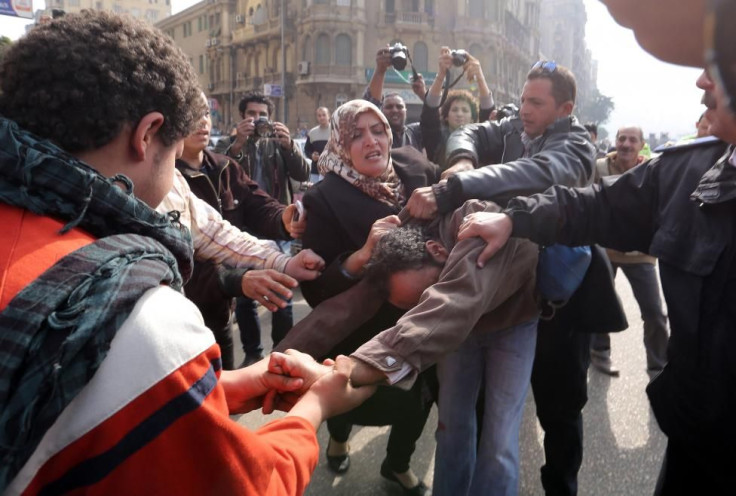Egypt 'Covering Up' Protest Deaths, Human Rights Group Says

The human-rights group Amnesty International accused Egyptian authorities of suppressing evidence that security forces either killed or contributed to the deaths of more than two dozen people during demonstrations last week. Official investigations into the deaths are allegedly aimed at whitewashing evidence, intimidating witnesses and holding at least two journalists and 500 protesters in unofficial detention centers in an effort to cover up the security forces’ actions, according to the group’s report published Sunday.
“The Egyptian authorities have long proved unwilling or incapable of delivering independent and impartial investigations into human-rights violations,” the London-based group said. “Harrowing scenes of protesters dying on the streets of Cairo are likely to be regularly repeated, given the authorities’ total failure to hold security forces to account for human-rights violations.”
At least 27 people -- including two women and a 10-year-old boy -- were killed Jan. 23-26 during demonstrations marking the Egyptian Revolution of 2011 that toppled former President Hosni Mubarak’s autocratic regime. Amnesty said police repeatedly fired tear gas, shotguns and other firearms into crowds of peaceful protesters. Some security forces also waited several hours before intervening in violent clashes between demonstrators and others, as Al Jazeera reported at the time. This delay in response led to several deaths, Amnesty said, citing video footage and photographs as well as testimony by protesters, lawyers and witnesses.
“Robust action is now needed by the international community to address the mounting death toll and human-rights crisis in Egypt,” Amnesty said.
The group said Egyptian authorities have detained at least 500 people across the country, including one woman, nine children and two disabled individuals, who Egyptian Interior Minister Mohamed Ibrahim has accused of supporting “the Muslim Brotherhood terrorist group.” At least 200 detainees are being held at the edge of Cairo in riot police camps, which are not recognized as official detention facilities and are not under judicial oversight, Amnesty said.
The group demanded Egyptian authorities immediately release the detainees and urged the U.S. and the European Union to continue freezing deliveries of arms and equipment. “Member states must act to hold the Egyptian authorities to account for widespread human-rights violations,” Amnesty said.
Eight Egyptian civil society organizations have also condemned what they call the unlawful killing of demonstrators by security forces, Daily News Egypt reported Sunday.
Egyptian authorities have not yet commented on the report. However, officials there have broadened a crackdown on political dissent.
After its Universal Periodic Review in November, the United Nations Human Rights Council provided Egypt with 300 recommendations relating to a controversial protest law, freedom of association, freedom of media, women’s rights and the use of the death penalty, Daily News Egypt said at the time.
© Copyright IBTimes 2025. All rights reserved.





















